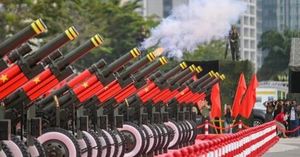On April 17, 2025, the Moscow Garrison Military Court delivered a significant verdict, sentencing former Deputy Chief of the General Staff of the Russian Armed Forces, Vadim Shamarin, to seven years in a strict regime colony for his involvement in a high-profile bribery case. This ruling marks a pivotal moment in a series of corruption scandals that have recently plagued the Russian military establishment.
The court's decision came after hearings that began on March 25, 2025, which were conducted behind closed doors. Shamarin was charged with two counts of receiving bribes of particularly large sums, allegedly amounting to 36 million rubles from the management of the Perm telephone plant, 'Telta'. In exchange for these bribes, Shamarin was expected to increase the volume of products supplied to the Ministry of Defense under government contracts.
According to the investigation, from 2016 to 2023, Shamarin facilitated contracts worth over 1.4 billion rubles with the 'Telta' plant, which specializes in communications equipment. The prosecution had requested a harsher sentence of 12 years in prison along with a fine of 107 million rubles, highlighting the severity of the charges against him. However, the court ultimately imposed a seven-year sentence, stripped him of his military rank, and banned him from holding public office for seven years.
Shamarin's case is part of a broader crackdown on corruption within the Russian military, which has seen several high-ranking officials arrested in recent months. Following his arrest on May 22, 2024, Shamarin was suspended from his duties. His legal proceedings were expedited as he entered into a deal with investigators, partially admitting guilt but maintaining that the total amount of the bribes he received was actually 19 million rubles, not 36 million.
The investigation revealed that Shamarin received bribes through intermediaries, including Alexey Vysokov, the general director of 'Telta', and Elena Grishina, the chief accountant. Both of these individuals have also been detained and are facing charges related to the bribery scheme. Furthermore, General-Major Alexander Ogloblin, a former subordinate of Shamarin, provided testimony that implicated him in the bribery, leading to his own arrest after initially being a witness in the case.
During the proceedings, Shamarin's defense attorney, Vladimir Shelupakhin, confirmed that they would not appeal the court's decision, indicating an acceptance of the verdict. Shelupakhin noted that the judicial process was conducted in a special order, which did not involve the examination of evidence due to Shamarin's cooperation with the investigation.
The court also ordered the confiscation of Shamarin's assets, which are estimated to be worth around 36 million rubles, including a luxury car and an apartment. This confiscation is part of the ongoing efforts to address corruption within the military, which has been under scrutiny following the resignation of former Defense Minister Sergei Shoigu in May 2024. Shoigu's departure was followed by a wave of arrests of military officials, including Deputy Minister of Defense Timur Ivanov and Yuri Kuznetsov, the head of the Personnel Directorate.
Shamarin's case is particularly notable as it is one of the first convictions following these recent scandals. As the judicial process continues for other implicated officials, including General Ivan Popov, who is facing similar charges, the fallout from these corruption cases could have lasting implications for the Russian military leadership.
In a surprising twist, Shamarin had requested to be sent to the zone of military operations, expressing a desire to serve his country despite the gravity of his situation. His request, however, was denied. Observers note that this case reflects a significant shift in how corruption is being addressed within the Russian military, suggesting that higher-ranking officials may no longer be immune to prosecution.
As the investigation into Shamarin's activities unfolds, it remains to be seen how this verdict will influence future cases and whether it will serve as a deterrent to other officials contemplating similar corrupt practices. The implications of this case extend beyond Shamarin himself, as it may signal a new era of accountability within the Russian defense establishment.










